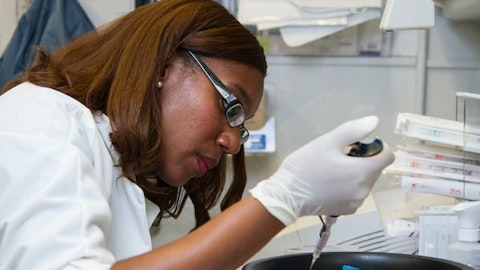And so we feel like IO we’re well-positioned. In the breast cancer, we’ve just stitching together a wealth of studies as we really push down on that. That’s one where there’s coverage now by another player. And so we, you know, you get some sense by what other players have done, what you need to do. And so we have a good sense of that. But long as probably more open and the other ones are more clear about what we need to do, but we feel like we’ll be in a well good position across the three.
Dan Brennan: Great. Thank you.
Operator: And our next question will come from Mark Massaro with VTIG. Please go ahead.
Mark Massaro: Hi guys, thank you for taking the questions. So my first one, it was great to see the initial TRACERx study data readout. Just for housekeeping. Is it right that we should see that next group of patients data readout around mid-2024? That’s the first part of my question.
Rich Chen: Yes. Hi, this is, Rich. I think that’s reasonable. That’s a reasonable target for us. Things can intervene to kind of make it come in or come out a little bit in terms of timing, but that’s probably a reasonable assumption.
Mark Massaro: Okay, great. And then Rich, this one might be for you. I think one of the interesting things about TRACERx is that I think, it started in non-small cell lung cancer, and I know that’s a big focus. But I believe other cancer states like melanoma, prostate and renal cancer are being investigated. Is that the case still? And are you guys having some conversations with Charlie’s group about potentially expanding beyond lung cancer into other cancer types?
Rich Chen: Yes, we haven’t publicly talked about expanding beyond lung cancer, because lung cancer is our major focus. But there you can imagine there are discussions about different avenues, it’s not just cancer types, but expanding our relationship with TRACERx.
Mark Massaro: Okay. I also wanted to ask about NeXT Dx, which I didn’t hear any comments on. How are the reimbursement discussions going there? And then, any update in terms of adoption and demand for the test?
Chris Hall: Yes, I mean, it’s, yes, so we continue the dialogue on NeXT Dx and reimbursement, we are still aspirational to get coverage into the year, still possible. And we’re managing towards that. We have a small handful of reps in the field, and they do talk about it, and they work on it. And we are seeing samples coming in. We are seeing – we’ve always believed that works hand in glove with IO monitoring for NeXT Personal. And our early experience so far is that that’s true, so that they – the products often may be ordered together. When a patient’s diagnosed in their later stage, and they go on I/O therapy, or they’re a candidate for that, the doctor will want to both create a baseline for NeXT Personal, while at the same time doing the therapy selection.
And so we’re seeing in our early access sites that that’s the case. And so we’re optimistic that the products will work together in the marketplace from a messaging standpoint. So rather than send the CGB test to vendor A, and then send the NeXT Personal to us, it would be better to be able to just send it both to us and have a one-stop shop. And so we’re seeing evidence that that will happen. And so the two products, the growth will actually synergistically.
Mark Massaro: Okay, great. Last question for me is on the Moderna partnership. I believe Moderna’s Phase 3 melanoma clinical trial is expected to start in the second half of the year. Do you have any update on that? And how should we think about Moderna and some of that broad interest on personalized cancer vaccines into the model in 2024?

